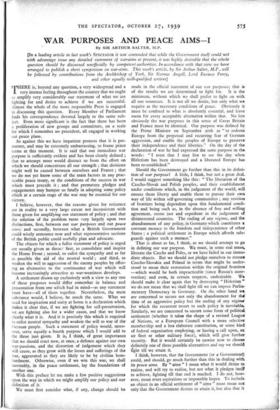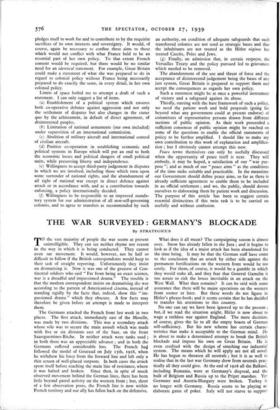WAR PURPOSES AND PEACE AIMS-I
By SIR ARTHUR SALTER, M.P.
[In a leading article in last week's SPECTATOR it was contended that while the Government itself could not with advantage issue any detailed statement of war-aims at present, it was highly desirable that the whole question should be discussed unofficially by competent authorities. In accordance with that view we have arranged to publish a short symposium on war-aims. This week's article, by Sir Arthur Salter, M.P., will be followed by contributions from the Archbishop of York, Sir Normal Angell, Lord Eustace Percy, and other equally well-qualified writers] THERE is, beyond any question, a very widespread and a very intense feeling throughout the country that we ought to amplify very considerably our statement of what we are fighting for and desire to achieve if we are successful. Almost the whole of the more responsible Press is engaged in discussing this question. Every Member of Parliament finds his correspondence devoted largely to the same sub- ject. Even more significant is the fact that there has been a proliferation of new groups and committees, on a scale for which I remember no precedent, all engaged in working out peace plans.
As against this we have impatient protests that it is pre- mature, and may be extremely embarrassing, to frame peace terms at this moment. It is said that our immediate war purpose is sufficiently evident and has been clearly defined ; that to attempt more would distract us from the effort on which we should concentrate all our strength ; that divisions might well be caused between ourselves and France ; that we do not yet know some of the main factors in any prac- ticable peace treaty, or the conditions of the success in war which must precede it ; and that premature pledges and engagements may hamper us fatally in adopting some policy which at a certain stage of the war may be essential for our victory.
I believe, however, that the reasons given for reticence are in reality to a very large extent not inconsistent with those given for amplifying our statement of policy ; and that the solution of the problem turns very largely upon two distinctions, first, between our war purposes and our peace aims; and secondly, between what a British Government could wisely announce now and what representative sections of the British public could usefully plan and advocate.
The objects for which a fuller statement of policy is urged are usually given as three:- first, to consolidate and inspire the Home Front ; second, to enlist the sympathy and as far as possible the aid of the neutral world ; and third, to weaken the will to aggression of the enemy peoples by offer- ing an alternative to the continuance of war which will become increasingly attractive as war-weariness develops.
A settlement drawn up exclusively with a view to any one of these purposes would differ somewhat in balance and presentation from one which had in mind—as any statement must have—all of them together. Nevertheless, the main substance would, I believe, be much the same. What we need for inspiration and unity at home is a declaration which makes it clear that, if we are fighting for self-preservation, we are fighting also for a wider cause, and that we know clearly what it is. And it is precisely this which is required to enlist neutral sympathy and weaken the will to war of the German people. Such a statement of policy would, more- over, serve equally a fourth purpose which I would add to the three just. given. It is, I think, of great importance that we should erect now, at once, a defence against our own war-passions, and the distortion of judgement which they will cause, as they grow with the losses and sufferings of the war, aggravated as they are likely to be by civilian bom- bardment. Otherwise, even if we win this war, we shall Inevitably, in the peace settlement, lay the foundations of another one.
With this preface let me make a few positive suggestions upon the way in which we might amplify our policy and our definition of it.
We must first consider what, if any, change should be made in the official statement of our war purposes; that is of the results we are determined to fight for. It is the minimum, without which we shall prefer to fight on with all our resources. It is not all we desire, but only what we require as the necessary conditions of peace. Obviously it must be confined to what is absolutely essential, and leave room for every acceptable alternative within that. No less obviously the war purposes in this sense of Great Britain and France must be identical. Our purpose was defined by the Prime Minister on September zoth as " to redeem Europe from the perpetual and recurring fear of German aggression, and enable the peoples of Europe to preserve their independence and their liberties." On the day of the declaration of war he had expressed the same purpose in the words: " I trust that I may live to see the day when Hitlerism has been destroyed and a liberated Europe has been re-established."
Should the Government go further than this in its defini- tion of war purpose? A little, I think, but not a great deal. I would suggest something like this: " The liberation of the Czecho-Slovak and Polish peoples, and their establishment under conditions which, in the judgement of the world, will ensure them liberty and enable them to pursue their own way of life within self-governing communities ; any revision of frontiers being dependent upon this fundamental condi- tion and being such as, in the absence of free and willing agreement, seems just and expedient in the judgement of disinterested countries. The ending of any regime, and the abandonment of any policy, in Germany which constitutes a constant menace to the freedom and independence of other States ; a political settlement in Europe which affords safe.; guards against such a menace."
That is about as far, I think, as we should attempt to go in defining our war purpose. We must, in some real sense, liberate the Czechs and Poles, or we have failed in our imme- diate objects. But we should not pledge ourselves to restore Czecho-Slovakia and Poland in terms that might be under- stood to mean their restoration within the original frontiers —which would be both impracticable (since Russia's inter- vention) and even, in certain respects, undesirable. We should make it clear again that by destroying " Hitlerism " we do not mean that we shall fight till we can impose Pasha. mentary Democracy in Germany. On the other hand we are concerned to secure not only the abandonment for th4 time of an aggressive policy but the ending of any regime for which the recurrent resort to such policy is inevitable. Similarly, we are concerned to secure some form of political, settlement (whether it takes the shape of a revised League of Nations, or a European Council with a more selective membership and a less elaborate constitution, or some kind of federal organisation employing, or having a call upon, an air fleet or other military force), which will give further security. But it would certainly be unwise now to choose definitely one of these possible alternatives and say we should fight till we attain it.
I think, however, that the Government (or a Government) could, and should, go much further than this in dealing with its peace aims. By " aims " I mean what it would desire to realise, and will try to realise, but not what it pledges itself to achieve, fighting till that end is reached. I do not, how- ever, mean were aspirations or impossible hopes. To include an object in an official settlement of " aims " must mean not only that the Government desires to attain it, but also that it pledges itself to work for and to contribute to by the requisite sacrifices of its own interests and sovereignty. It would, of course, again be necessary to confine these aims to those which would not conflict with what France held to be an essential part of her own policy. To that extent French consent would be required, but there would be no similar need for an identical statement. For example, Great Britain could make a statement of what she was prepared to do in regard to colonial policy without France being necessarily prepared to do exactly the same, in every detail, in her own colonial policy.
Limits of space forbid me to attempt a draft of such a statement. I can only suggest a list of items.
(a) Establishment of a political system which ensures both co-operative defence against aggression and not only the settlement of disputes but also changes in the status quo by the arbitrament, in default of direct agreement, of disinterested peoples.
(b) Limitation of national armaments (our own included) under supervision of an international commission.
(c) Abolition of military aircraft and international control of civilian aircraft.
(d) Positive co-operation in establishing economic and political systems in Europe which will put an end to both the economic losses and political dangers of small political units, while preserving liberty and independence.
(e) Willingness to accept third-party judgement in disputes in which we are involved, including those which turn upon some surrender of national rights, and the abandonment of all right of national war except in direct defence against attack or in accordance with, and as a contribution towards enforcing, a policy internationally decided.
(f) Willingness to be responsible to an improved manda- tory system for our administration of all non-self-governing colonies, and to agree to transfers as recommended by such an authority, on condition of adequate safeguards that such transferred colonies are not used as strategic bases and that the inhabitants are not treated as the Hitler regime has treated Czechs, Poles and Jews.
(g) Finally, an admission that, in certain respects, the Versailles Treaty and the policy pursued led to grievances which needed to be removed.
The abandonment of the use and threat of force and the acceptance of disinterested judgement being the bases of any just system, Great Britain is prepared to support them and accept the consequences as regards her own policy.
Such a statement might be at once a powerful instrument of victory and a safeguard against its abuse.
Thirdly, starting with the bare framework of such a policy, we need the patient work and bold proposals (going far beyond what any government could at present endorse) of committees of representative persons drawn from different sections of public opinion. As their work proceeded a sufficient consensus of public opinion might be reached on some of the questions to enable the official statements of policy to be further amplified. I should like to make my own contribution to this work of explanation and amplifica- tion ; but I obviously cannot attempt this now.
Peace terms themselves can only be usefully discussed when the opportunity of peace itself is near. They will embody, it may be hoped, a satisfaction of our " war pur- pose "; and as much of our " peace aims " as the conditions of the time make suitable and practicable. In the meantime our Government should define peace aims, so far as there is already sufficient agreement to enable them to be included in an official settlement ; and we, the public, should devote ourselves to elaborating them by patient work and discussion. The purpose of this article has been to suggest certain essential distinctions if this twin task is to be carried on usefully and without confusion.









































 Previous page
Previous page